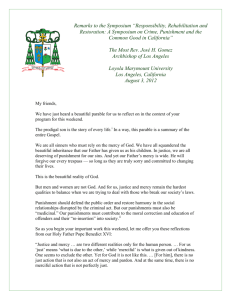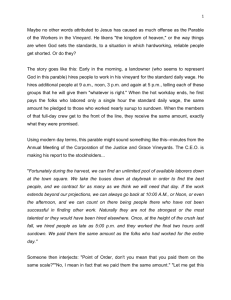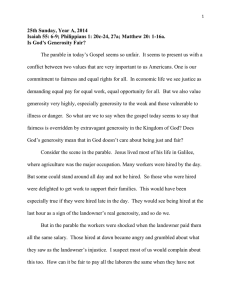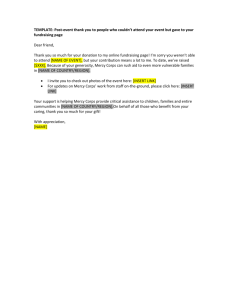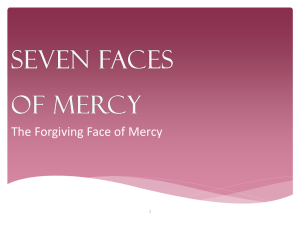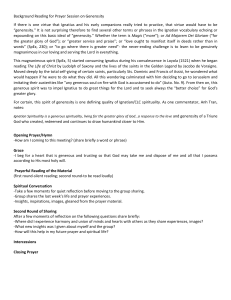25 Sunday 2011
advertisement
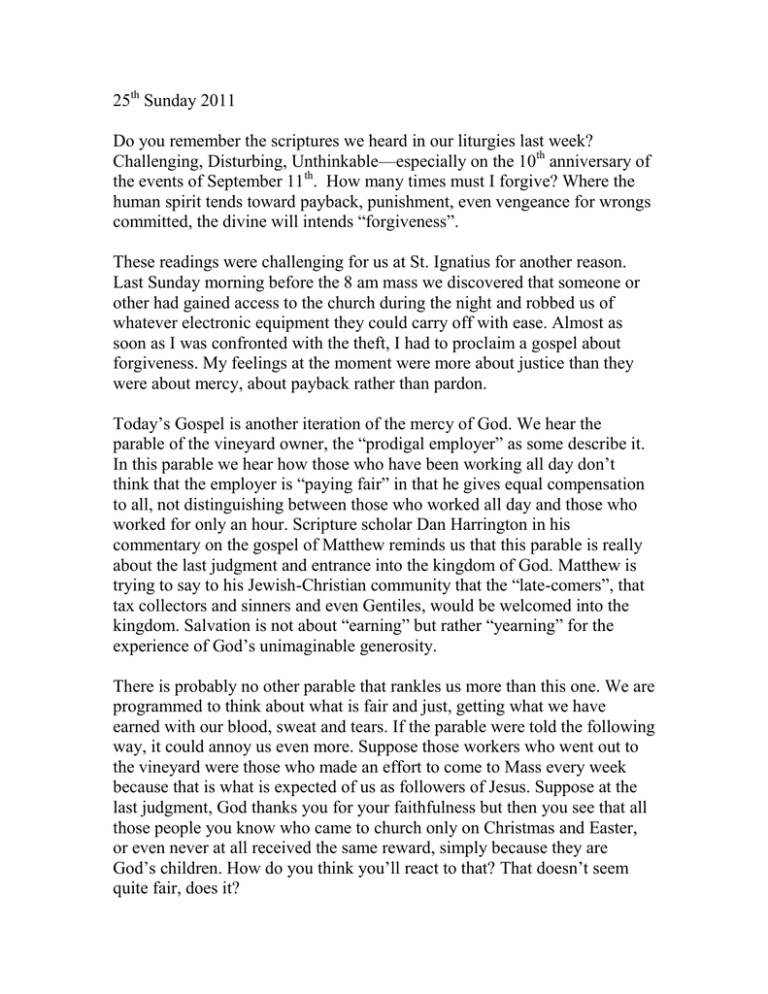
25th Sunday 2011 Do you remember the scriptures we heard in our liturgies last week? Challenging, Disturbing, Unthinkable—especially on the 10th anniversary of the events of September 11th. How many times must I forgive? Where the human spirit tends toward payback, punishment, even vengeance for wrongs committed, the divine will intends “forgiveness”. These readings were challenging for us at St. Ignatius for another reason. Last Sunday morning before the 8 am mass we discovered that someone or other had gained access to the church during the night and robbed us of whatever electronic equipment they could carry off with ease. Almost as soon as I was confronted with the theft, I had to proclaim a gospel about forgiveness. My feelings at the moment were more about justice than they were about mercy, about payback rather than pardon. Today’s Gospel is another iteration of the mercy of God. We hear the parable of the vineyard owner, the “prodigal employer” as some describe it. In this parable we hear how those who have been working all day don’t think that the employer is “paying fair” in that he gives equal compensation to all, not distinguishing between those who worked all day and those who worked for only an hour. Scripture scholar Dan Harrington in his commentary on the gospel of Matthew reminds us that this parable is really about the last judgment and entrance into the kingdom of God. Matthew is trying to say to his Jewish-Christian community that the “late-comers”, that tax collectors and sinners and even Gentiles, would be welcomed into the kingdom. Salvation is not about “earning” but rather “yearning” for the experience of God’s unimaginable generosity. There is probably no other parable that rankles us more than this one. We are programmed to think about what is fair and just, getting what we have earned with our blood, sweat and tears. If the parable were told the following way, it could annoy us even more. Suppose those workers who went out to the vineyard were those who made an effort to come to Mass every week because that is what is expected of us as followers of Jesus. Suppose at the last judgment, God thanks you for your faithfulness but then you see that all those people you know who came to church only on Christmas and Easter, or even never at all received the same reward, simply because they are God’s children. How do you think you’ll react to that? That doesn’t seem quite fair, does it? Today’s parable is really about the balance between God’s justice and God’s mercy, the Generous heart of God. Of course we don’t know how it will all end up in the final judgment. We cannot imagine how God’s justice and mercy will be shown to us at the End of the Ages. As we heard in the first reading from the prophet Isaiah, “My thoughts are not your thoughts. My ways are not your ways.” So what might we take with us from this parable? Jesus offers his followers a model of generosity. He reveals a God who is nothing if not generous in mercy and compassion. St. Ignatius of Loyola was one person who experienced the generous heart of God in such an intimate, transformative way that all he wanted from his life was to respond with complete generosity. I imagine you’ve heard this prayer before. Lord teach me to be generous. Teach me to serve you as you deserve To give and not to count the cost To fight and not to heed the wounds To toil and not to seek for rest To labor and not to ask for reward Save that of knowing that I do your will. St. Ignatius would echo the words of St. Paul we heard today: For me to live is Christ. As Christ Jesus models for us what it means to be generous beyond our human imaginings, to love us and embrace us as we are, Ignatius through his Spiritual Exercises provides a way in which we can “seek the Lord and find God in all things”. When we do encounter the God who is mercy beyond measure, we will know that we are called to be co-workers in the vineyard. We are called to share the mission of Christ and respond with completely generosity.
